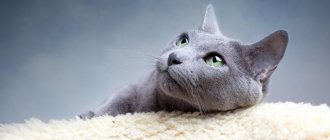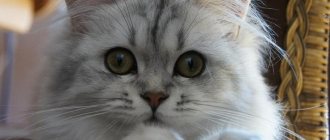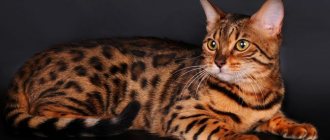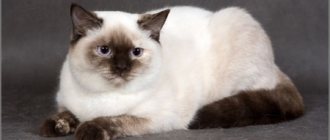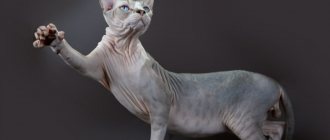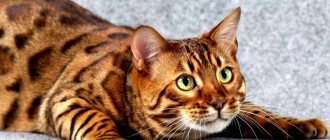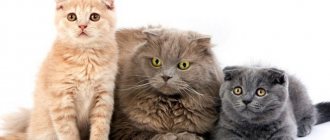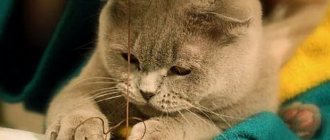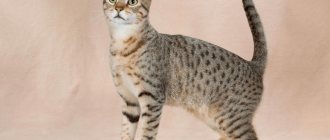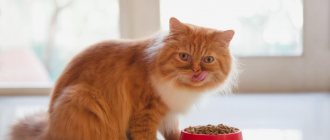Cats, like many other pets, become not just friends and companions for people, but family members.
At the same time, they not only bring joy and love to the family, but also participate in shows and exhibitions. In this case, they fight with their brothers for the title of best in the breed and often become champions. And it is felinologists—professional judges—who give the pets their assessments. But this is only one of the niches of this profession.
History of the profession
The first mention of felinology can be dated back to the end of the 19th century. On July 13, 1871, the world's first cat exhibition took place in London, organized by animal artist Grayson Weir. 170 cats of various breeds took part in it, and Weir himself was among the judges. This event marked the beginning of the emergence of the first breed standards. Then communities of cat lovers began to appear throughout the UK, and later throughout the world. In 1887, the world's first club for lovers of these animals, called the National cat club, was organized. It still exists today. In 1910, the felinological association of clubs GCCF (Governing Council of the Cat Fancy) appeared.
In 2002, for the first time in Russia, the opportunity arose to officially obtain higher education in the field of felinology at the Moscow Agricultural Academy named after. K. A. Timiryazeva.
Hobby or profession?
Let's figure out what their occupation is for felinologists: a hobby or a job.
From a generally accepted point of view, a profession is what a person does during his main working hours, and a hobby is an interest in his free time. A profession brings income, but a hobby requires financial investment. Professional pursuits require effort, in some ways even forcing yourself, in order to achieve some success. A hobby is for the soul, and, as a rule, a person does not strive to achieve any heights on purpose, everything turns out by itself.
Did you know? Iodine was invented thanks to a cat who jumped on a table and knocked over test tubes. Animal scientists conduct research during working hours and receive a salary for this. To become a livestock specialist, you need to study at a university for 5 years. To conduct research you need good laboratory equipment, which cannot be purchased with personal savings. Based on this, a livestock specialist is a profession.
If we consider breeders, caring for and breeding cats requires not only working time, but also non-working time.
Selling purebred kittens brings real money, but for this you need to want to buy kittens for that kind of money. This means investing money in a purebred mom and dad, feeding them with expensive food and vitamins, washing them with expensive shampoos, vaccinating them, taking them to the veterinarian, filling out documents, taking them to exhibitions, paying fees, and receiving awards. To these expenses you need to add the possible birth of rejected kittens, their death, and the death of the cat.
To register a nursery, you need to run around with paperwork and complete courses. At the same time, we can say that a person who does not like cats will not be able to pay so much attention to them and spend money on them. Therefore, being a breeder is both a hobby and a profession at the same time.
The expert has working hours during which he evaluates cats, for which he receives a salary and has the opportunity to travel around the world for free. To become an expert, a person has to study for a long time, study the intricacies of breed standards.
At the same time, the man was a breeder for a long time, devoting both working and non-working time to breeding, he invested a lot of money and effort in his training, he simply cannot help but love cats. This means that an expert combines both a profession and a hobby.
Important! Felinologist is a profession that requires a creative approach, passion, financial expenses and complete immersion in the matter. So, there are people who have turned the love of cats into a separate science that studies them, and we found out what it is called. Felinology is a special branch of science
. If you want to do it, you need to truly love cats, understand your responsibility to them, have a desire to develop in terms of accumulating knowledge, and develop memory. To become a felinologist, you need to turn your hobby into a profession.
Popular questions about professions working with animals
What are the highest paying professions working with animals?
In the segment under consideration, veterinarians receive the highest salaries. In Moscow, the salary of this specialist can exceed 150,000 rubles, which is equivalent to the salary of a good programmer.
The second lines in the ranking of highly paid professions working with animals are occupied by felinologists, dog handlers, groomers, protection agents, canine therapists, ornithologists, and zoologists. Their salary ranges from 40,000-70,000 rubles, but it all depends on experience and talent. The more animals they work with, the higher the income.
The worst paid work is for milkmaids and veterinary paramedics, who can claim a salary not exceeding 20,000-30,000 rubles.
Are there any professions related to both animals and travel?
Ornithologists and zoologists are often sent on business trips abroad. Aquarists and felinologists often travel both within their native country and abroad, searching for and studying interesting individuals. Trainers working in circus troupes travel around the world during tours.
If you want to not only work with animals, but also travel the world, you can become a naturalist. Naturalists (naturalists) study nature as it is. They visit different countries to show the world rare animals. The profession is suitable for women and men of any age who are willing to take risks.
Important! Naturalists can host their own shows; over the years of their career they manage to visit many exotic countries, but this profession is dangerous. For example, in the early 2000s, famous naturalist Steve Irwin died from a stingray attack.
Another interesting profession in working with animals, which involves travel and a good salary, is a dolphin trainer. Specialists have the opportunity to take up vacancies in famous museums dedicated to the sea and dolphinariums. Coaches are constantly in contact with their students, teaching them how to interact with people, sing, and draw. They take care of adult and small dolphins. To work in this field, you must have a higher education in biology or ecology.
What other professions are there for working with animals?
People who love animals come into contact with them constantly when working as photographers. Yes, owners of purebred cats, dogs and other fauna often order photo sessions for their pets.
Animal photographers can work in a studio or travel the world taking photographs for renowned magazines such as National Geographic. The profession is suitable for people of any age who know how to use a camera. A quick reaction is important, because a beautiful monkey or bird will not patiently pose until you create a successful shot.
You can also choose one of the following professions:
- ecologist, dealing with the problems of global warming, extinction of populations of animals, fish, birds, insects;
- a handler specializing in the professional demonstration of dogs during exhibitions;
- ichthyologist, professionally engaged in the study of the characteristics and evolution of fish;
- a jockey who works as a rider during a race;
- groomer specializing in horse training. He also helps people learn the basics of horse riding.
Another interesting dynastic profession was called taxidermist. These specialists create stuffed animals and birds. In the CIS countries, the profession can only be mastered privately; at the moment there is no faculty for taxidermists in universities and colleges!
Who studies cats?
As a professional activity, felinology has existed since the second half of the 19th century. It was during this period that communities of cat lovers began to appear in Great Britain, which later merged into a single organization, the Governing Council of the Cat Fancy (GCCF), focused on exhibition activities and standardization of animal breeds. Solving the problems facing the club members required specific knowledge. This is how felinologists appeared - specialists with a narrow focus who study such aspects of working with cats as:
- animal breeding;
- selection;
- development of products for pets (food, cosmetics, safe toys, etc.);
- supervision of factory circles and events held by them (exhibitions, etc.);
- training future colleagues - experts in the considered areas of activity.
Regardless of their profile, such specialists united in special organizations. Among the most respected felinological societies around the world, functioning to this day, are:
- The Governing Council of the Cat Fancy (GCCF);
- Federation International Feline (FIFe);
- World Cat Federation (WCF);
- The Cat Fanciers Association (CFA);
- The Cat Fanciers Federation (CFF);
- The International Cat Association (TICA);
- International Felinological Association (IFA) registered in Russia;
- International Cat Union (ICU);
- World Association of Cat Clubs (WACC);
- Alliance SuperCats (ASC).
Today, the tasks facing the participants of these clubs are somewhat different from those that were solved by representatives of this unusual profession 100 years ago. What are felinologists working on these days?
From the history of felinology
On July 13, 1871, in London at the Crystal Palace, animal artist and cat connoisseur Harrison Weir organized the world's first cat exhibition. 170 cats took part in the exhibition. The experts at the exhibition were Weir himself, his brother John (an entomologist and ornithologist) and Reverend McDonna (a specialist in the St. Bernard dog breed).
In 1887, the world's first club for cat lovers, the National cat club, was created in Great Britain. This club still exists today. The NCC was the first to register cats in stud books and develop breed standards. By the beginning of the 20th century, there were already about 15 clubs operating in Great Britain, which in 1910 united into the first felinological association (system) of clubs - the Governing Council of the Cat Fancy (GCCF).
Since 1987, felinology began to develop in Russia.
What does felinology do, why is this section of zoology called that?
Why is the field of zoology that deals with the study of cats called felinology? This word comes from the Latin root "felinus". Combined with the widely used ancient Greek "λόγος", it is literally translated into Russian as "cat science".
It was difficult to find a more precise definition for the name of the direction, which studies the physiology of cats, develops optimal conditions for keeping them, as well as standardizes breeds (including breeding new ones and improving existing ones).
Modern felinological science covers even more types of activities directly related to breeding and caring for domestic felines. This may include:
- organizing and holding cat shows;
- creation and registration of nurseries for breeding purebred animals;
- exercising supervision over all of the above areas.
Like any scientific activity, felinology should be carried out by specialists with appropriate specialized education. What are such people called and what areas of cat life are within their competence?
Methods for breeding new breeds
Felinology is the science of cats, which also studies the anatomical and physiological characteristics of the domestic cat.
All the diversity of breeds arises in the process of many years of selection work. The main methods of carrying out breeding work remain the method of selection and selection.
Selection is the process of retaining for later breeding animals of a certain type with a set of desired characteristics and properties.
In order for selection to be possible, it is necessary to identify the direction in which it will be carried out by determining the required types and characteristic features, and then select from the offspring the specimens most suitable for these characteristics.
Selection is a method of crossing selected pairs of animals in order to produce offspring with approximately expected characteristics.
It is impossible not to note the fact that, in fact, recruitment and selection methods are stages of one path to breeding a new breed. Established traits have to be selected from previously selected individuals.
Felinology is the science of our furry pets. Do this science and become better owners for your cats.
A person who studies the behavior of domestic cats and cats is a felinologist. How to learn this profession, and what knowledge should a specialist have? Where do felinologists work and is there a high demand for them?
Variety of felinology profiles
Despite the fact that all felinologists study cats and have knowledge in the field of zoology and selection, there is a clear structure of profiles among specialists:
- Felinologist-zootechnician. A specialist who graduated from an agricultural or agricultural university. He can work in cat clubs, but most often he does research in special laboratories and scientific institutes.
- Breeder-felinologist. A person who has a certificate of completion of full-time or correspondence courses in felinology. The received document makes it possible to open your own nursery and engage in breeding of cats of one or more breeds.
- Expert felinologist. Felinologist breeder who has completed many courses and seminars. Can conduct examinations, act as a judge at cat shows and give them grades.
Anyone who decides to engage in this science must receive an appropriate education.
Mr. Cat recommends: where you can study to become a felinologist
Information about training to become a felinologist is not often circulated among students, but, in addition to private and expensive courses, you can also get an education in government institutions (even in absentia), passing the final exam and receiving a full-fledged specialist title:
- Russian State Agrarian University named after Timiryazev (Moscow);
- Ryazan State Agrarian Correspondence University.
- Ryazan State Agrotechnical University named after Kostychev.
- International boards of expert felinologists.
- At courses and seminars at the largest cat clubs in Moscow, St. Petersburg, other regional centers and cities of Russia.
1111
Features of the profession
Felinology is a science that studies the physiology, anatomy of domestic cats, their behavior, as well as the nuances of breeding and keeping.
A specialist in this field, usually either a club owner or an expert at a show, sometimes these are professional cat breeders. The animal care industry cannot do without felinologists. Developers of food, pet products and medicines also belong to this profession.
The main tasks that felinologists solve when uniting in associations:
The most famous world associations:
The 12 largest organizations operate at the global level. Some of them adhere to the European grading system, and some to the American one. The European system is more closed, the judge fills out the assessment sheet without witnesses, in a separate room. American is a show where the audience is present, and the judge evaluates openly.
Interesting! Cat shows are held not only among purebred animals, but also among outbred ones. In this case, the external beauty of pets, their character, and harmonious build are assessed. Each criterion is assessed in points, and the participant who scores the maximum number wins.
The depth of knowledge that felinologists require to perform their functions suggests that this is not a hobby, but a real profession. But where are domestic cat specialists trained?
Where are specialists trained?
A specialist with a higher education can apply himself as an animal engineer in a laboratory, a judge at a competition, manage a nursery or club, or give consultations. Without a higher education, a person who deeply studies domestic cats most often becomes a professional breeder. After the courses they work in a nursery.
The salaries of specialists vary from 20 to 80 thousand rubles on average. It depends on the place of work and level of education. Often people engage in felinology as a hobby and are employed in other places.
Several universities teach professions in Russia, for example:
Feline clubs conduct courses and seminars. You can obtain a certificate in the following institutions:
Some organizations offer year-round correspondence courses for beginners.
Hierarchy of feline systems
The experts of the cat world are led by the World Cat Congress. including felinological systems. The systems include commissions (for example, exhibition ones) that are responsible for checking smaller units - breeding clubs. Breeders, who in turn are managers of nurseries, register in breeding clubs.
So, the hierarchy in the world of felinology can be represented as follows:
- World Felinological Congress - includes felinological systems. Responsible for collaboration between organizations on important cat welfare issues. This also applies to the legislative level;
- Feline systems and associations index cats by breed and color (assign an index), determine the principles of selection and judging, register nurseries, and develop rules for assessing breeds. Each organization has a list of other organizations whose lineages and judges it recognizes;
- Commissions - monitor compliance with the rules of the system;
- Breeding clubs - issue certificates to nurseries, register litters of kittens, prepare pedigrees, and also organize exhibitions and advise on breeding;
- Catteries and breeders are registered owners with at least one cat capable of producing offspring. When breeding, they are guided by system standards.
As a rule, a nursery or breeder registers his professional activities in the club. However, there are systems where participation in the club is not mandatory. Such organizations have direct membership of cat owners (for example, TICA, ASSOLUX). Responsibility for breeding in this case lies entirely with the breeder. Therefore, participation in such systems is recommended only to responsible owners. Clubs can decide for themselves which system they want to participate in. It is also possible to refuse to join organizations. In this case, exhibitions will be held according to the standards of the system whose experts will be invited to judge.
What personal qualities should a felinologist have?
Love for animals, kindness and lack of allergies to wool are the key qualities necessary for a person who decides to become a felinologist. If they are available, you can move on to studying breeds and other features of the profession, which will require perseverance and determination. During the learning process, the advantage will be:
- good memory,
- ability to quickly master new knowledge,
- ability to work with large amounts of information.
It is known that even ordinary keeping of pets requires a lot of time and responsible attitude. For a specialist involved in breeding purebred cats, this requirement is doubly relevant. The breeder needs to be careful and pedantic, since cats need regular care, and maintaining order in the place where they are kept is a lot of work.
Observation, honesty, punctuality and the ability to analyze play a big role. These qualities are especially important for judges. In addition, during exhibitions you need to be able to find an approach to different people, so the specialist must be sociable and polite.
The main characteristics of the formed breed
The main features of the breed include:
- Common ancestry - all animals of a given breed descend from a limited number of ancestors, ideally from one common ancestor.
- Commonality of characteristics - animals represented in the same breed have similar physiological characteristics.
- The importance of the number of individuals - a breed can be considered as such when there is a sufficiently large population in which the possibility of inbreeding is excluded.
- The territorial distribution of a breed is the presence of breeding points for representatives of the breed in various places that differ in climatic, geographical and natural conditions.
- Breed constancy is stability in the inheritance of traits characteristic of a given breed.
READ How to treat a cat for poisoning Advice from a veterinarian
Advantages of the profession of felinologist
The profession of felinologist is chosen only by those who truly love their job. This is their main advantage. Good specialists are highly valued in narrow circles. People turn to them for consultations, which significantly increases their self-esteem. Recognition of the work of a felinologist is confirmed by diplomas and certificates received by their “wards” at exhibitions.
Victories at exhibitions also help increase earnings, since the value of a cat with a good pedigree increases significantly after receiving a diploma. The income of breeders largely depends on the breed chosen for breeding, the ability to promote their services and the number of animals in their care. On average, profit can be about 25-50 thousand rubles per month.
The profession is not limited by a strict work schedule (with the exception of experts working in laboratories), so it can be combined with the main job or taken on part-time jobs. An additional advantage will be the opportunity to travel around the world, taking part in international exhibitions.
Sale of kittens. Tips for breeders
For members of special clubs there is the opportunity to sell directly at exhibitions, as well as disseminate information among other club members.
No less popular is the method of posting advertisements on the Internet, preferably on thematic forums, in groups of lovers of certain breeds of cats.
Nurseries with an already established reputation prefer to advertise their pupils on separate websites. You will have to pay extra for these services, but it is this format that inspires the most confidence among buyers and will attract the maximum profit.
Kitten registration
The owner of a breeding cat must register the offspring no later than one month after birth. All necessary information is submitted to the club, which will then issue metrics.
Joining specialized clubs
The contract for the purchase and sale of cats for breeding, as well as the metric issued by the breeder, gives the new owner the right to register the animal in any club. It doesn’t have to be a parents’ club; you can choose any one that suits you. This is necessary for further participation in exhibitions, without which you will not be able to obtain the right to breed.
Participation in exhibitions
You can take part in exhibitions from 8 months. Before this, you are allowed to act as a third-party spectator, accustoming the kitten to such an atmosphere.
The number of exhibitions in which an animal participates is not regulated. There is usually a fee to participate, with travel costs increasing in some cases.
Sale without breeding rights
Congenital genetic defects or critical non-compliance with breed standards make the animal unsuitable for breeding.
Such kittens are sold with the mark “pat” in the metric; adult animals are often sterilized. This is a necessary measure to stop the attempts of unscrupulous breeders to thoughtlessly replenish the army of stray animals. Breeding costs in this case will not be covered by the sale of kittens that only look a little like the declared breed, so the offspring often turn out to be unnecessary.
Disadvantages of the felinologist profession
Caring for cats takes a lot of time and effort. Not every person is able to devote himself completely to working with animals. In addition, before a felinologist begins to earn money by breeding purebred animals, he will have to invest a lot in his business. Moreover, the amount of costs will depend on the rarity of the selected breed.
The felinologist does not have a wide field for action. The sales market in this direction is very specific and narrow. In addition, demand is not always proportional to supply. There is quite high competition among breeders. Fashion trends are also a factor in determining commercial success. While breeding one breed, a felinologist may “burn out” if the trend determining demand changes.
What problems do felinologists solve?
All felinologists in the world today are united in two large associations - the American TICA and the European WCF. Although there are a lot of less significant and large organizations.
WCF includes amateur felinological clubs from different countries, regions, and cities. And they, in turn, regulate all issues of nurseries and breeders. At competitions, judging takes place in a closed format.
TICA is an association in which catteries are registered directly. And felinologist-judges evaluate animals in the rings, publicly making assessments and telling the audience about the merits and demerits of all pets participating in the show.
Felinology is studied in special courses; they can be organized by large associations, clubs, and private experienced felinologists. After completion, a specialist certificate is issued.
What should knowledge be?
A felinologist is not a synonym for a veterinarian. A specialist is not required to understand diseases, but he must know all breed standards approved by leading international cat associations.
His responsibilities include not only accurately determining whether an animal belongs to a particular variety, but also identifying the correct “breed” traits. In this area there are many external factors (color, paw length, head size and shape, height at the withers, ear structure, etc.) that determine the standards.
With such knowledge, felinologists are indispensable at competitions and at the stage of examining breeding kittens.
The salary of a specialist starts from 40-60 thousand rubles, and the upper limit, especially when working for a private employer, is not defined.
Ailurophilia - or crazy cat people
In this article I want to draw a line between such views on the attitude towards cats as: who are just cat lovers, and who are crazy cat lovers.
So read:
- What is ailurophilia?
- Who is at risk for this disease.
- The parasitic cause of the disease is toxoplasmosis.
- What does our state think about the number of cats in an apartment?
- Did Hemingway suffer from ailurophilia?
There are also such concepts as:
- Ailurophobia – fear of cats;
- Ailuromania is an unhealthy interest in cats.
But that is another topic . Here we talk about people who passionately love cats.
It has been noticed that in many cases this disease affects lonely old women who are no longer needed by anyone and have no one else to care for them. In this case, cats help them cope with loneliness and fill not only their life, but also their home with their presence.
You've probably seen stories on TV more than once when neighbors complain about old ladies who have a lot of cats at home, and sometimes there are just too many!
Who are these people who passionately love cats:
- Lonely old men and women;
- Just lonely people who have lost their loved ones;
- Closed people;
- People who, due to their bad character, do not get along well with others;
- People who are sexually attracted to cats.
Types of felinologists
The most famous, widespread and authoritative felinological organizations are the World Federation of Cat Fanciers - WCF (World Cat Federation) and the International Feline Organization - FIFe (Federation International Feline). Representatives of these associations meet twice a year at the World Felinological Congress to approve or change general provisions.
A felinologist is a specialist who deals with domestic cats; he is the one who researches, evaluates, evaluates and, before doing this, receives a special education.
Livestock specialist
The profession of livestock specialist in the broad sense of the word involves the development and control of conditions for keeping livestock in order to increase their productivity. Zootechnician-felinologist develops:
- new types of cat food;
- vitamin complexes for cats;
- various products related to caring for cats;
- carries out research work related to breeding cats and improving their living conditions.
Important! In order to work as a livestock specialist, you need to obtain a higher education.
Breeder
A felinologist-breeder is a specialist in breeding cats. This includes cat nursery owners who specialize in breeding one or more cat breeds. They can also become owners of purebred cats.
The difference between a breeder and ordinary owners of purebred cats is registration: breeders have special documents confirming their pedigree, registration with the Federation of Felinologists, and permission to reproduce. Breeders do not breed their cats with just anyone and will not sell a kitten without getting to know the future owner properly.
We advise you to find out why cats purr and meow
A higher education is not necessary for this; it is enough to complete the courses.
Expert
An expert felinologist is basically a former cat breeder who has additionally studied a lot and for a long time in special courses, studying the breed standards in great detail. Having received the appropriate documents, these people become judges at cat shows. It is not necessary for an expert, like a breeder, to graduate from a higher educational institution.
Important! The first place for a felinologist should be love for cats, a kind attitude and a desire to provide them with the best conditions.
Expenses of experts associated with the exhibition are paid by those who organized it.
Where is felinological knowledge used?
Now, while receiving a felinological education, a student acquires general knowledge in zoology, breeding, etc. However, at the same time, he also masters a narrow specialization. In modern “cat science” there are several main directions. So, a felinologist can become:
- Livestock specialist. He studies issues of physiology and selection of cats in a specialized scientific institute or laboratory. At the same time, he can give practical advice on keeping and breeding animals.
- Breeder. A specialist with the appropriate education has the right not only to breed purebred animals on his territory, but also to officially establish a nursery for rare cats.
- An expert. These high-class professionals are mainly involved in evaluating participants at cat shows.
It is worth noting that each of the listed specialties requires a different level of education. How to get this or that specific profession?
Who else studies cats?
Another specialist in the behavior of animals, including domestic cats, is called a zoopsychologist. A professional in this field understands how mental processes occur in an animal, how it perceives the world around it, and how its intelligence develops.
Often, the services of an animal psychologist are used when they want to find out the nature of an anomaly in an animal’s behavior: aggression, fear. After all, the reasons for this can be both diseases of the nervous system and a reaction to stress. An animal psychologist is able to understand a situation that the owner is powerless to understand.
Such specialists deal not only with domestic animals, but also with wild animals. They work in scientific laboratories, clubs, and provide private consultations.
To learn a profession, you can enroll in a university, for example, the Agricultural Academy named after. Timiryazev, or another institution where psychology is taught, as a rule, there is also a separate department of zoopsychology. At Moscow State University, at the Faculty of Psychology, there is a laboratory of zoopsychology. Not only practical research is conducted, but lectures are also given to students.
Almost a third of people who have pets keep cats. In order to be able to choose the right pet, care for the pet and train it, many begin to get acquainted with the science called felinology. From Latin this word is translated as “the science of cats.” This section of zoology studies the anatomical structure, features of breeding and keeping cats of various breeds. By studying felinology, the owner of the animal will be able to learn more about the properties of the breed: health characteristics, some character traits and the intricacies of caring for a pet.
How to become a felinologist?
The first university providing official felinological education in Russia appeared in 2002. The corresponding department was opened at the Moscow Agricultural Academy named after K. A. Timiryazev.
By 2020, the number of specialized educational institutions in this area has increased significantly. Today, “credentials” as a felinologist specialist can be obtained at almost any agricultural or agricultural university in the country. A graduate of such a university officially becomes a cat breeder. You will have to spend only 5 years on this.
To become a professional breeder, by today's standards, you don't even need such a diploma. You can legally open your own nursery by receiving just a certificate indicating that its bearer has completed a full-time or correspondence course in this specialty.
It is more difficult to acquire the status of a felinologist-expert. In addition to taking the usual courses for breeders, those who want to become such a specialist will have to regularly attend relevant seminars to improve their skills.
Here, many may have a logical question: isn’t keeping and breeding cats, even purebred ones, just a pleasant hobby? Why invest so many resources - time and finances - into getting an education in a field that is essentially just a hobby, but not a full-fledged profession?
It is impossible to answer this question unequivocally. Felinology as a field of activity requires such a specific combination of professionalism and personal involvement in the process that it is very difficult to compare it with any other work.
On the one hand, animal specialists and experts who evaluate cats work according to a schedule and have a fixed salary. Professional breeders can even feel like businessmen, receiving a good income from the sale of raised animals. On the other hand, the listed areas of activity require the investment of such an amount of personal time and finances that it is simply impossible to do something like this without a living passion and interest.
In short, a felinologist is a very promising and highly paid specialty at the moment. However, only those who really care about cats and are ready to devote their entire lives to caring for these animals should get an education in this profile.
Feline instructor
This qualification is needed to become a breeder, open a cattery and breed purebred cats.
If you love cats, work from home or have the opportunity not to work, and are willing to devote all your time to cats, then perhaps you will enjoy being a breeder.
But it is worth noting that such a profession does not bring significant income, rather the opposite. Pedigree cats require special care, which costs a lot of money.
First steps to become a felinologist instructor:
- Select the breed you want to train;
- Select a club for a given breed;
- Complete felinologist courses;
- Successfully pass the exam and receive a Certificate with the qualification “felinologist instructor”;
- Buy a cat kitten of the selected breed of breeding class;
- Register the nursery with a felinological organization.
- ... and then years of pleasure from constant communication with cats and raising kittens
Responsibilities
Felinologists are big cat lovers who have managed to turn their passion into their life’s work. The profession is represented in several areas: expert felinologists, breeders, nursery managers, judge felinologists.
An expert felinologist is a true cat expert. He can easily determine whether an animal belongs to a particular breed. A specialist is often approached to identify the most “promising” kitten from a breeding point of view.
To become a felinologist judge, you must obtain the appropriate license, which is issued after completing paid courses. The judge must have an excellent knowledge of the breed standards developed by the World Cat Federation (WCF). This document contains detailed information about the characteristics of the head, paws, neck, tail, body, coat and color. A point scale for evaluation with a detailed explanation is also given here.
Breeders and managers of nurseries are most often owners of purebred cats. These are specialists in breeding and selection of animals.
Stop the fall!
The elasticity and mobility of the intervertebral joints, the cat’s lack of a strong connection between the front legs and the skeleton, and the presence of the vestibular apparatus in the inner ear help the “owner of nine lives” to coordinate her actions and land on all four.
When a cat unexpectedly falls from a great height, the first thing it does is straighten its head, pull its paws closer to its head and rotate as it falls, slowing it down.
In most cases, the cat rolls over to the right, approaching the ground, trying to extend its paws
During the last turn, the cat arches its back, and when landing, it puts out its front paws.
Fact: If a cat dives like a soldier from a height, it is unlikely to be able to land on its feet.
Modern associations of felinologists
The World Cat Federation (WCF) unites 370 organizations around the world. It develops breed standards, issues international-level judge certificates, and manages the international registration of nursery names.
There are also federations and associations:
- FIFe (Federation International Feline);
- CFA (The Cat Fanciers Association);
- ASSOLUX International;
- CFF (The Cat Fanciers Federation);
- TICA (The International Cat Association);
- IFA (International Felinological Association);
- ICU (International Cat Union);
- WACC (World Association of Cat Clubs.
There are associations of cat lovers at the national level in different countries. For example, in Russia: RFF (Russian Felinological Federation), FAR (Felinological Association "Ros").
IKEF (International College of Expert Felinologists) brings together experts from a wide variety of clubs and systems.
So, there are people who have turned the love of cats into a separate science that studies them, and we found out what it is called. Felinology is a special branch of science. If you want to do it, you need to truly love cats, understand your responsibility to them, and have a desire to develop in terms of accumulating knowledge. To become a good felinologist, you need to turn your favorite hobby into a profession.
Where do they teach
Universities
Russian State Agrarian University - Moscow Agricultural Academy named after K. A. Timiryazev (RGAU-MS Agricultural University named after K. A. Timiryazev)
Faculty of Zoological Engineering,
Department of Zoology,
Specialization "felinology".
Russian State Agrarian Correspondence University
Faculty of Zoological Engineering,
Specialization "felinology".
As well as regional universities in the agricultural sector:
Ryazan State Agrotechnological University named after. P.A. Kostycheva
Faculty of Veterinary Medicine and Biotechnology
Specialty: Animal Science,
Specialization: cynology and felinology.
And other universities
Courses, seminars
Courses and seminars on felinology can be taken at felinological clubs and federations.
For example, under the Russian Felinological Federation (RFF), the Felinological Association "Ros" (FAR), the International Association of Cat Fanciers Assolux, etc.
The International Board of Expert Felinologists of the IFF also deals with improving the qualifications of judges and conducts seminars.
Noun, number of synonyms: 2 zoology (33) cat science (2) ASIS Dictionary of Synonyms. V.N. Trishin. 2013 ... Dictionary of synonyms
AND; and. The science that studies cats. * * * FELINOLOGY FELINOLOGY (from Latin felinus feline and Greek logos word, doctrine), the science of domestic cats (see DOMESTIC CATS). Studies the anatomy and physiology of domestic cats,... ... Encyclopedic Dictionary
G. The scientific discipline that studies cats. Ephraim's explanatory dictionary. T. F. Efremova. 2000 ... Modern explanatory dictionary of the Russian language by Efremova
felinology
- felinol ogy, and ... Russian spelling dictionary
felinology
— (1 g), R., D., Ave. felinol/gyi... Spelling dictionary of the Russian language
felinology
- And; and. (English feline feline and lógos teaching) The science that studies cats ... Dictionary of many expressions
Felinology
- (felinus feline and Greek lógos teaching), the science of. Studies the anatomy and physiology of the domestic cat, its evolution, breeds, breeding and selection issues. A specialist who deals with felinology is called a felinologist... Encyclopedia “Animals in the House”
Classic calico cat Calico cat is a domestic cat with spots or partial coloring; Typically white fur with orange and black spots. English... Wikipedia
Head of the state institution “Publishing House of Karelia” (Petrozavodsk, Republic of Karelia) since 2000; born March 17, 1955 in Petrozavodsk; graduated from Petrozavodsk State University with a degree in... ... Large biographical encyclopedia
Books
- Felinology. Study guide, Blokhina Tatyana Vladimirovna. Thanks to this manual, the student will have an idea of the subject and tasks of felinology, the significance of felinology and its connection with other branches of biology. The lecture course covers questions...
- Felinology. Tutorial. State stamp of the Ministry of Agriculture, Tatyana Vladimirovna Blokhina. Based on this manual, the student will have an idea of the subject and tasks of felinology, the significance of felinology and its connection with other branches of biology. The lectures cover questions...
Crossword puzzle "Science of cats" for elementary school students
Crossword about cats with answers
Tolstikova Tatyana Aleksandrovna Description: I bring to your attention a crossword puzzle about cats, solving which you can usefully spend your free time. By answering all the questions correctly, you can find out the name of the science that studies cats.
The material may be of interest to primary school teachers and parents for organizing leisure time for younger schoolchildren. Purpose: solving a crossword puzzle Objectives: to introduce and consolidate knowledge about some facts and events related to cats, develop logic, attention, memory, develop an interest in reading, broaden the horizons of children
March 1 is World Cat Day. On this day, cat shows are organized everywhere, everyone pampers their pets with delicious treats, holds house parties, and takes care of homeless animals. And I propose that on this day you spend time solving this crossword puzzle, which will help you not only remember literary cats and a little history, but also learn some interesting facts from the life of these beloved animals. And if you complete all the tasks, you will find out the name of the science that studies our pets.
1 question
2 question 3 question 4 question 5 question 6 question 7 question
8 question 9 question 10 question 11 question
The science that studies cats is called felinology.
Literature:
N.A. Shaulskaya “2500 questions for school quizzes”, series “Hello, school!”

